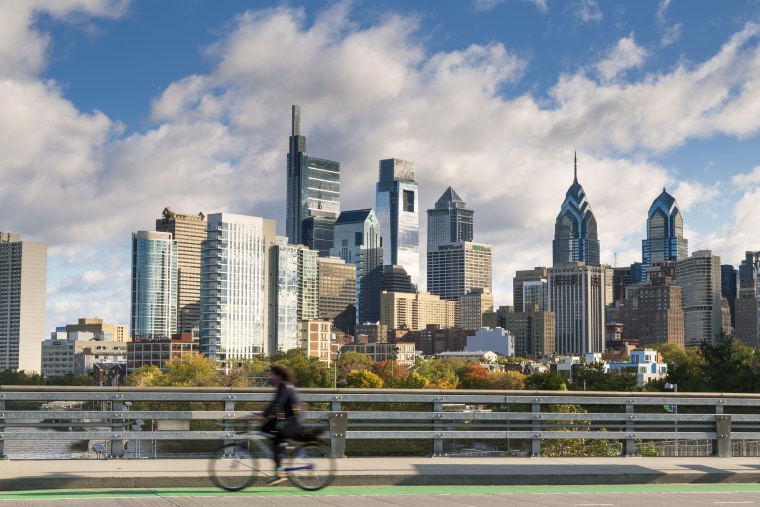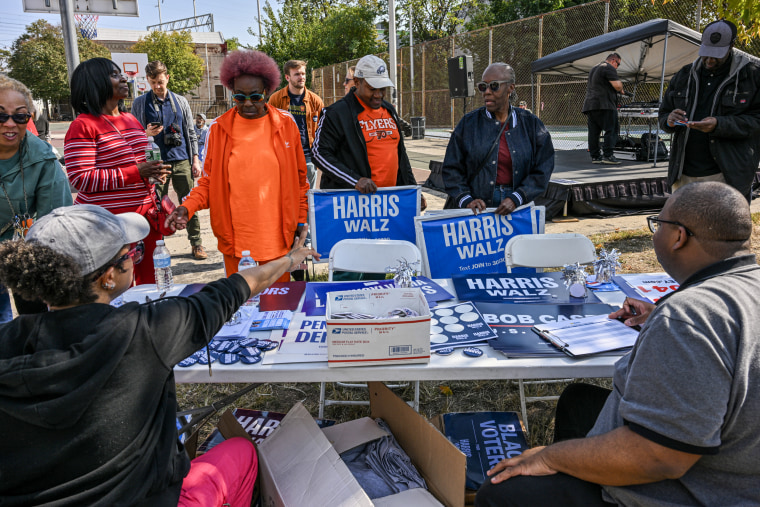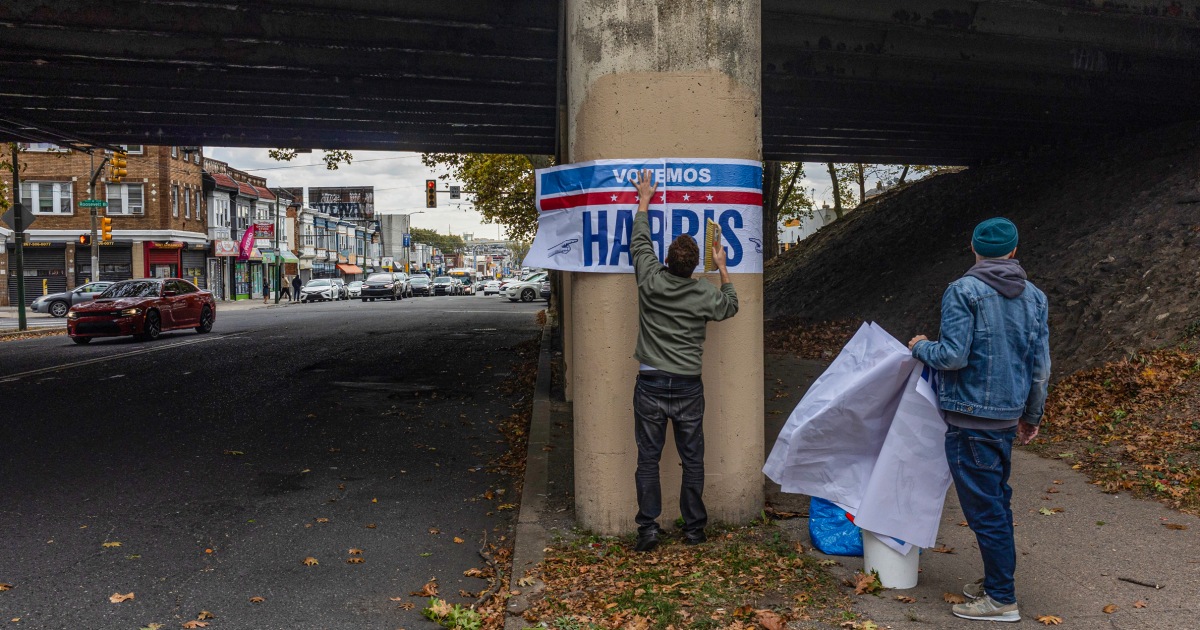In the critical suburbs of Philly, Harris volunteers hunt for winnable Republicans
Both Harris and Trump are making frequent visits to the suburbs as Election Day nears, a measure of the region’s outsize importance. Trump chose Bucks County for his recent photo-op working the fryer at a local McDonald’s restaurant. Harris’ town-hall-style event on CNN last week took place in Delaware County.
A dizzying number of possibilities could tip the result in Pennsylvania one way or the other. Even if Harris performs well in the suburbs, can she count on the Democratic stronghold of Philadelphia to turn out in the numbers needed to win? It’s tough to predict.
Bob Brady, chairman of the city Democratic Party and a longtime Philadelphia power broker, said he expects that Harris will attract more Black votes than Biden would have won had he stayed in the race. But he also said Harris won’t do as well as Biden in largely white precincts in northeast and south Philadelphia.
Hosting a pizza party for Philadelphia ward leaders last week, Brady said in an interview, “I’ve got friends, a couple of them will be here today, and they’re for Trump. You can’t talk to them. He’s got that 47% of zealots. It’s scary as hell.”
A kerfuffle between the city’s Democratic leadership and the Harris campaign could complicate the outcome. A Philadelphia tradition is to pay “street money” to Democratic foot soldiers who help turn out the vote in presidential elections. The Harris campaign committed to pay $100 apiece to the 3,500 city Democratic committee members involved in get-out-the-vote efforts, a city party official said, but Philadelphia Democrats are asking for more money.
If they get it, Brady said the money would help pay more people to canvass neighborhoods and get voters to the polls.
“They [the Harris campaign] didn’t give us enough,” Brady said. “Someone is telling them not to give it to us. I don’t know who, but they’re making a major mistake.”
A Harris campaign official said in response: “Of course Bob Brady loves the idea, because they use the money to pay committee people to stand at the polls on Election Day.”
While “people need that check, that’s not a major piece to how we win a campaign and that’s why we aren’t giving him everything he wants,” the official added.
‘Excitement, dread and tension’
No one looking for a respite from the election should venture anywhere near the Philly suburbs. A dog who cheerfully greeted customers at a men’s clothing store in Wayne wore a little Harris-Walz sweater.
A random conversation at a table in a local Italian restaurant included a snippet about ticket-splitting: “Trump could very well win Pennsylvania and Casey could also win.” (Sen. Bob Casey, a Pennsylvania Democrat, is up for re-election this year.)
Trump and Harris signs pop up everywhere — at least the ones that haven’t been stolen. Harris supporters say thieves have been showing up at night and running off with yard signs. Owners have tried different deterrents, even posting notes on the signs saying that if any are taken, they’ll give a $100 donation to Harris’ campaign. But the vandalism has continued. A bunch of Harris signs were found strewn in a ditch in Montgomery County.

When he canvasses neighborhoods and speaks to voters, Hoeffel said he hears the same plaintive plea within the first few seconds: “They want the election to be over!”
Yet there’s also a blend of excitement, dread and tension about a race that has taken dark turns. Neil Makhija, a Montgomery County commissioner and chairman of the local board of elections, said he’s gotten complaints from residents who’ve felt intimidated by people lurking around ballot drop boxes, recording them as they deposit their envelopes. He said he’s forwarded the complaints to the district attorney’s office.
Local officials are also bracing for a slew of postelection challenges to the results. Josh Maxwell, chairman of Chester County’s board of commissioners, said the county has already received more than 200 challenges to mail-in ballot applications — a number he said is unusually high. The challenges center on people who have requested mail-in ballots in Pennsylvania, but who also have addresses outside the state.
“Having a second home in Florida doesn’t prevent you from voting in Pennsylvania,” Maxwell said in an interview.
The challenges, he added, will need to be adjudicated and add “another layer of undue suspicion at a time when people absolutely don’t want it.”
‘Shiny toys’
Both sides expect the result in Pennsylvania to be tight. As of Friday, Democrats have returned ballots in numbers exceeding Republicans in Philadelphia and each of the four counties, though that does not necessarily correlate to votes for Harris or Trump. And Democrats have historically outperformed Republicans in early voting volume.

The election will test the potency of two disparate campaign models. Democrats are relying on Harris, but also on field work ensuring that voters actually vote. In the last week, the Harris campaign says that it has knocked on 235,000 doors in the suburban counties alone.
Trump’s model is largely built around his persona and the emotional connection he has forged with his base. His ground game appears to be more modest, targeting “low-propensity voters” who may not be following the election closely though they lean toward Trump. The Trump campaign official said that the campaign has opened a total of four offices in the suburbs.
But the Trump official said that bigger isn’t necessarily better, pointing to state voter registration trends. Between 2021 and 2024, thanks in part to a change in state law that automatically registered more voters, the Democrats’ voter registration advantage in Pennsylvania was cut in half and now stands at about 300,000.
Referring to the Harris campaign’s $1 billion fundraising haul, the Trump official added: “They have a lot of shiny toys on their side. They have a billion dollars to blow; they should have a lot of shiny toys. But unless the shiny toys are doing something, they’re just shiny toys.”
‘I get energized’
A nerve center of the Harris ground game is its office in Wayne. On a recent afternoon, volunteers came in for training and to gather materials needed to meet voters and record responses on a cellphone app.

